Dying Truth Read online
Dying Truth
Jay Nadal
Contents
Join My VIP Group
Chapter 1
Chapter 2
Chapter 3
Chapter 4
Chapter 5
Chapter 6
Chapter 7
Chapter 8
Chapter 9
Chapter 10
Chapter 11
Chapter 12
Chapter 13
Chapter 14
Chapter 15
Chapter 16
Chapter 17
Chapter 18
Chapter 19
Chapter 20
Chapter 21
Chapter 22
Chapter 23
Chapter 24
Chapter 25
Chapter 26
Chapter 27
Chapter 28
Chapter 29
Chapter 30
Chapter 31
Chapter 32
Chapter 33
Chapter 34
Chapter 35
Subscribe to my VIP group
Current book list
Other ways to stay in touch
About the Author
Join My VIP Group
If you haven’t already joined, then to say thank you for buying or downloading this book, I’d like to invite you to join my exclusive VIP group where new subscribers get some of my books for FREE. So, if you want to be notified of future releases and special offers ahead of the pack, sign up using the link below:
Click here to sign up
Published by 282publishing.com
Copyright @ Jay Nadal 2019
All rights reserved.
Jay Nadal has asserted his right to be identified as the author of this work.
No part of this book may be reproduced, stored in any retrieval system, or transmitted in any form or by any means, electronic, mechanical, photocopying, recording or otherwise, without the prior written permission of the author.
This book is a work of fiction, names, characters, businesses, organisations, places and events other than those clearly in the public domain, are either the product of the author’s imagination or used fictitiously. Any resemblance to actual persons, living or dead, events or locales is entirely coincidental.
1
Glass crunched underfoot. The air was a thick gag of spilled liquor and blood. Sweat stung his eyes. A gun barrel faced him. It wavered as the hand holding it shook. Cade stared past it. He made himself stare past that black hole. It dipped and bobbed like a rattler’s head. But he looked past it to the wide eyes of the man holding the gun. Clinton Reeves looked dead. His eyes were sunken caves above gaunt cheeks. He twitched like he’d been on a five-day drink marathon. Foam flecked the corners of his mouth.
“Just me, Clinton. No one else, and no guns. Now you’ve got a real hostage. How about letting those others go, huh?”
“I need ’em. The cops’ll kill me, man. They’ll come in here and kill me.”
“No one’s going to hurt you, Clinton. Not if you let them go. The cops will see you’ve got compassion.”
“No way, man. I need ’em. I need ’em!”
Cade wanted to scream. He felt like he was watching a movie. One he knew inside and out, the story building toward a tragedy he could feel coming. But he was also an actor in that movie. He couldn’t do a thing to change the storyline. Not even once. He knew what was coming, and he’d helped the story to its gory climax.
Clinton demanded a drink, and Cade proffered an intact bottle of vodka. Clinton broke the neck and guzzled the contents. He spat the clear liquid out in fury and hurled the bottle against the wall. The Hispanic girl screamed as it exploded above her head. The black man flinched away. Cade looked toward the door as Clinton ranted and that rattler in his hand wove between all four of them.
Cade knew Alexa was behind him, taking a firing position that would leave her exposed. He wanted to run to her. Wanted to throw her back out of the line of fire. But he couldn’t move. It wasn’t his part.
“Just put that thing down. Let’s talk. You and me. That just causes problems. My partner and I are the only ones here. There’s no one else. Put the gun down. Nobody is waiting to kill you. Please.”
That was new.
“Please, Clinton. It doesn’t have to go down like this. Please.”
He was off script. That wasn’t how it had happened. Cade felt wetness on his cheeks. He couldn’t watch it happen again. Not again. One of the hostages let out a panicked, keening noise. Reeves looked in the man’s direction as he ran. Cade leapt for Reeves as the weaving rattler struck. Blood blossomed in the man’s back, and still the shots rang out. They punched Rivera back through the air. Blood sprayed from her throat and mouth. Cade dove for Reeves and saw him fall from Rivera’s own shots.
He fell to the floor. His thigh was bleeding, the blood black against his uniform trousers. He clutched it because that’s what you did. He couldn’t feel any pain. Reeves was dead. Rivera was dead. Again. He had failed. Again. And only the screaming remained.
Cade woke. His eyes wide open, he drew in a sharp breath. He wanted to scream. The dream clutched at him, he could see Discount Liquor around him, and the metallic tang of blood lacquered his teeth. His cheeks were cold from tears. He filled his lungs and let the air out, refusing to give in to the adrenaline spike that had woken him from the nightmare. The usual nightmare. Cade’s tense muscles relaxed. The motel room appeared before him, reality bleeding through the dream. The adrenaline left his system.
He wasn’t in Houston. This wasn’t Discount Liquor, and Officer Alexa Rivera was a year dead. Cade had made his last overnight stop in a long journey at the Motel 8 on the highway outside the town of Flint, New Hampshire. He turned to look at the time. Six-fifteen. That figured. He couldn’t remember the last time he had been able to sleep after the dream had been replayed. Cade was sure the police shrink that they had forced him to see after the Discount Liquor incident had mentioned something about recurring dreams. He hadn’t listened. Hadn’t engaged. What did that guy know, anyway?
The nicotine craving roared inside of him like an untamed beast. He reached for the nightstand, pushing away the beer cans from the night before, and grabbed the soft pack of Marlboros. There were half a dozen cigarettes in the pack, and he put one between his lips. It had been marked with blue ink at the tip. He didn’t light it. Cade held it there in his mouth while the craving battered at his gut. He was down to one a day. This one had lasted him three days so far. One day he would light it up and start all over again with the next one. And maybe one day he would quit. Not today. Today he rolled it around his mouth as he stared up at the ceiling.
He had quit smoking six years before, not long after he’d met Elaine. She had given him an ultimatum. And she had proved worth the discomfort. The craving had hit him once after a supposed therapy session. Cade had gone straight to the nearest convenience store and bought a pack of smokes and a six-pack of beer. That had been the start.
He got up as the whispered craving sharpened into a scream. He put the cigarette aside and took a shower, then dressed. Same thing he had been wearing for the last two thousand miles and five days of driving. Blue jeans, pale and frayed. Faded T-shirt, which used to be black, under a plain shirt. He buttoned up the shirt against the northern chill. The locals didn’t notice the drop in temperature at this time of year, but Cade felt it. Sturdy walking boots carried the ingrained dust of the West Texas desert. He took a swig of stale beer and spat it into the sink, then picked up a baseball cap, faded on top and stained dark around the inner rim. For a moment, he stared at his reflection in the bathroom mirror.
“Boy, what they going to make of you?” he asked himself.
His jaw was rough with stubble, a
nd the lines on his face seemed set in concrete. He pulled the hat down to shadow his eyes and walked out of the room. Outside, the October air hit him like a bucket of cold water. The humidity approached Houstons at this time of year, but it was a cool wetness. He took a deep breath. Opposite the motel’s parking lot, trees lined the highway. Mist clung to the ground, and dew sparkled on leaves.
The pine trees were blue green, and there was some kind of plant growing along the highway with maple-shaped leaves of deep green. The stalks of dead flowers drooped among the healthy leaves, like empty glasses after a wild party. A bird sang in rapid, clustered trills. There was something about the noisy silence of the country, whether the brutal wilderness of West Texas or this damp, verdant forest. He could feel a peace settling on him. He took out his phone and, with practiced movements, swiped his way to one of the few apps he ever used. Ellie’s face beamed out at him from her Facebook page.
It had been Elaine’s idea to keep the page open. To use it as a place to share pictures of their daughter with the world and allow Ellie’s friends to contribute or share stories. Cade liked to look at Ellie’s pictures. The dream loosened the final tenuous hold it had on him. He breathed in fresh forest air and let Ellie’s freckled face soothe the constant ache inside.
A jarring noise brought his head up and his muscles taut. He winced as the tension brought on a dull ache in his back, acquired from many hours behind the wheel of a pickup that hadn’t been designed for comfort even when it was new. He felt every bit as old as the ’82 Ford he drove. A teenage girl pushed a cart piled with plates and cups, drinks urns, and glass pitchers. She unlocked the doors of the reception area and hauled the rattling cart through to stock the communal breakfast bar. Cade walked over, trying to work the cramps out of his calves.
“Morning,” he smiled.
The girl looked to be about eighteen, wearing a company uniform in red and white. She had a rash of acne across her cheek and gave him a slight, harassed smile.
“Good morning to you, sir.” To Cade she sounded like a Kennedy. Morning was drawn out to mawning. He thought he no doubt sounded like John Wayne to her.
“I’m aiming to be heading out early today. Can I get a coffee before I hit the road?”
“Ahhh, sure. Let me set up these urns, and then you’re good to go.” She lifted one of the chrome cylinders from the trolley to a covered table. “You don’t sound local.”
“Texas, ma’am.” Cade touched the bill of his cap.
“Wow, you’re a long way from home. What brings you all the way up here?”
“Family. My sister moved up here with her husband.”
“So, did you fly in to Lebanon?”
“No. I don’ much like flying. I drove up.”
“Better you than me,” the girl laughed. She set out cups in front of the urn and poured one for Cade. “Well, there y’go. Fresh coffee for ya. I’ve got milk and sweetener on the cart. If you give me a minute, you can have breakfast to go with it.”
“That’s okay, darlin’. Black coffee’s all I need,” Cade grinned.
“So, do you have much farther to go?”
“About thirty miles. Burford. Y’know it?”
“Yeah, I’ve been out that way once or twice. Hey, isn’t that where those green protestors are, environmental people?”
“Got me there. Haven’t heard about it.”
“Yeah, there was something on the radio. Some professor is holding a public meeting ’cause they’re going to be drilling for oil or something.”
“Oil? In New England?” Cade questioned.
“Or something, I don’t know. But there is a protest. Or was. The biggest thing to happen in Burford for years. Kind of a small place, off the beaten track.”
“Yep, that’s what they told me.”
“Your sister really wanted to get away from it all, huh?”
“Sure did.”
“So has she been here long?”
“I think they moved out here three years ago. Her husband is from somewhere around here.”
A knot of tension settled in his stomach, and he turned away from the girl to look out the window at the highway and the trees. He sipped the steaming black coffee. It tasted burned, leaving a scalding trail down his gullet. He couldn’t help but sigh after the first sip. The girl continued her bustle and didn’t seem to notice.
“Nothin’ like that first cup of coffee in the morning, right?” she asked.
“Guess not,” Cade replied.
It had taken him six months to get rid of that gut-churning tension. Six months sleeping in the back of his truck, taking work fixing fences across eight-hundred acres of ranch. The constant tension had faded beneath the honest burn of sore muscles and the nights under a blanket of stars. The thought of being in the middle of a family again brought it back. Was he even ready? He felt jagged and unsettled. He fit nowhere, except maybe the desert.
“You mind if I take this cup outside, miss?” His earlier joviality was lost beneath cold courtesy.
“No, just don’t forget to bring it back before you leave.”
He stepped out, sipping more coffee, glad not to maintain the facade of cordiality.
Cade pushed back his cap, letting the cool air settle on his face. Madison would be how old now? Seven? Eight? She took after Beth, which meant she looked a lot like Ellie. Damn. He fought an urge to get straight back into his truck and head south. Keep going ’til his tires were kicking up dust and the sun beat down anyone dumb enough to be out in it too long. The coffee added to the tension. He could feel his back tensing and perpetuating the clenching ache that was already there. He threw the black liquid out across the parking lot and put the cup down on a tall ceramic plant pot beside the main doors.
The girl inside yelled a protest as he strode away, forgetting the cup. Within five minutes, the room was clear of any signs he had been there, and Cade was on the road. He headed north.
2
The local radio stations came through as though being broadcast from the moon. Cade twisted the Ford’s ancient radio dial through bland eighties pop that cracked and fizzed with static. He gave up and pushed the cassette back in. The cab filled with the hiss of an old recording and the soft babble of conversation as Bill Evans at the Village Vanguard played. Delicate piano notes underscored by a free-roaming rhythm section washed over him. He wound the window down, enjoying the smell of the forest air.
The road wound its way uphill, with thick woods on either side. The pines formed secret worlds of shadowy caves beneath their interlocking branches. He felt the urge to pull over and walk into one of those cool pools of darkness. To lose himself in another world. Ellie had loved the outdoors. No sooner had she put on a dress than there were grass stains on it. Or bark stains. Or tears from brambles or tree branches. He remembered lying face down in the grass of the backyard with her, the pair of them like a couple of braves working their way forward on their elbows toward an inquisitive squirrel that hadn’t yet registered their presence.
The squirrel always got wise and dashed away with an outraged chitter. Ellie always got up and chased it. Memories tortured him. It hurt, but he didn’t want to stop. Elaine had wanted to leave Houston, move out to a small town and get a job teaching grade school. She imagined a one-room schoolhouse. Cade would be the town sheriff, taking naps in the afternoon. How many hours had the two of them passed, sitting in the backyard in the evenings, imagining their future. Elaine had rescued a swing chair from a lawn sale one summer, and it became a fixture of their idyllic evenings.
The melancholy swept over him again as the road reached a summit. The trees were sparse and shared the heights with formations of rock. Rusty reds now appeared among the green. The highway swept around a shoulder of rock, and below, for the first time, he saw the town of Burford. He pulled over on a sudden whim. As he stopped, a truck roared past with an annoyed blaring of its horn. Surprise took Cade. He had been so engrossed in his memories, he hadn’t realized the truck had been fo
llowing so closely.
He memorized the license plate and the logo on the back of the truck. Blue and yellow, and stylized letters L and E. A policeman’s instinct to record everything. He stopped himself. That was over. He got out of the truck and leaned on the safety barrier. Below was a steep, stony slope down to another stretch of the road. In the distance, the sun sparkled off the broad, flat ribbon of a river, the Grey River. He made out a cluster of buildings spread along two highways that crossed each other at right angles. A white building with a tall steeple stood on one of those highways at one end of town. A broad red brick building stood at the other end. Cade saw houses scattered in open plots here and there down the valley to the river. Closer in, they were bunched together on tree-lined streets. The town looked tranquil. He could see Elaine living here. And Ellie. But not him. He just didn’t think he could fit in a place like this. Too much harshness had crept into him.
It took the best part of an hour to wind his way down among the pines once again. It was almost eight-thirty, and the sun was high enough to dispel the early-morning mist. A few clouds scudded along, but it looked like it would be a pleasant day. As he drove, several more semis passed him. Each bore the same logo, NorEl Mining. He passed a gated entrance carrying a blue and yellow sign. A heavily rutted dirt track cut through the trees beyond the chain-link fence in which the gate stood. A growing smell of gasoline had bugged him since the long climb up out of the Flint Valley into the Grey. He had a vague set of directions in his head to Beth’s house, but decided to make a detour first.

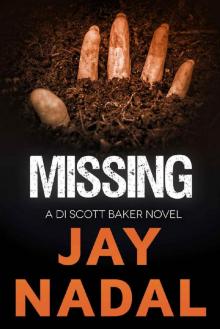 Missing
Missing The Lies They Told
The Lies They Told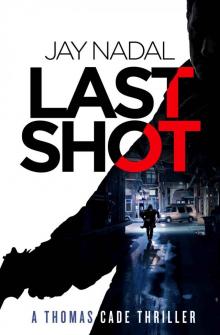 Last Shot
Last Shot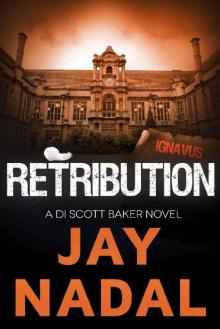 Retribution
Retribution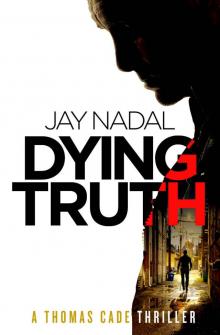 Dying Truth
Dying Truth Captive
Captive Isolation
Isolation Sacrifice
Sacrifice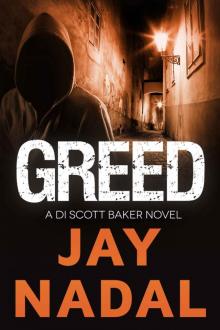 Greed: A DI Scott Baker Novel
Greed: A DI Scott Baker Novel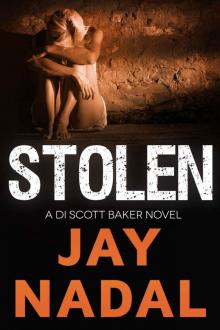 Stolen: A DI Scott Baker Novel
Stolen: A DI Scott Baker Novel